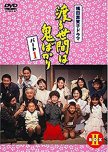 A Stalker's Guide to Eguchi Yosuke
A Stalker's Guide to Eguchi Yosuke Seven good buddies left school and stepped into society. Each then finds life out there not as carefree as it used to be. Their courage, optimism and confidence are also worn off slowly by the cunning reality. After a series of hurdles, they get a deeper understanding of their friendship and treasure it even more. Edit Translation
- English
- magyar / magyar nyelv
- dansk
- Norsk
- Native Title: 愛という名のもとに
- Also Known As: Ai to iu Nano Moto ni , In the Name of Love
- Screenwriter: Nojima Shinji
- Genres: Romance, Life, Drama
Cast & Credits
- Suzuki Honami Main Role
- Karasawa Toshiaki Main Role
- Eguchi Yosuke Main Role
- Doguchi YorikoIimori NorikoSupport Role
- Ishibashi TamotsuTsukawara JunSupport Role
- Nakano HideoKurata AtsushiSupport Role
Reviews

90s Japan hits different
Maybe because it’s only my second live-action show from this era (put Tokyo Love Story on brief hold to see this), but as soon as the first episode began, with friends cheering on their friends from the riverbank in the fall of 1988, and the sound of water lapped by oars and the plaintive keys on a piano, I knew I’d found something real. It was only twelve episodes, and the majority of their meals happening in the same Italian bar, and every time something happened they’d all come rushing over – and the same few tracks playing throughout the show – but it was golden, astoundingly adult for people my age, and now, with Shogo Hamada’s intro single “Sorrows Falling Down Like Snowflakes,” imprinted, indelibly, upon my mind.I think the last time I felt this emotionally tied to a live-action show’s struggles was when I finished My Mister for the first time in 2021. I was extraordinarily fortunate to watch In the Name of Love in the days before, during, and after my retake of the bar exam, the same age as the characters, and, like them, at the cusp of finding adulthood as it is presented in this show – choosing a path forward in your life based on the kind of person you want to be, both for yourself and for those you love.
Here our lead, Takako, manager of the group of friends back in their halcyon, tireless days of rowing in college, and still their manager after their reunion – she is who they go to, she mediates conflict, and, unsurprisingly, she is admired and loved by both Kengo and Tokio. I started this show after being utterly knocked off my feet by the actress’s previous performance in Tokyo Love Story. While here she isn’t quite the same, Takako the more I watched her the more I felt compelled like her peers to admire her tenacity in the face of conflict, and to smile and marvel at her strength and attempts to keep the group together. While a part of her I think echoed the sentiments of women’s individuality of the era, I think that only reflected even more just how strong she was. Always stepping forward, one foot after the next – and, like the others, we see how she needs them far more than she realizes.
Kengo, the aspiring politician who led the rowing team, and who leads them now by his seemingly immutable sense of morals. Being the son and secretary of a Parliament Member, groomed from birth into his dream to do good for the country, stout and believable. The others look to him, whether because of his sense of justice or because of his ability to pull some strings. Tokio, his opposite but (after Takako) my favorite, his actor also from Tokyo Love Story but (like Takako) in a far more mature role. He’s still laidback and easygoing, doesn’t stick to a job and didn’t change at all since college – but, like Takako, tries his damnedest to keep the group together, even if his way involves punching his best friends if they’ve done wrong and he might break into your apartment building to save you. But that’s Tokio, and I felt that he plays a superb foil to both Takako and Kengo in his way. As Kengo has his stolid look, Tokio has his of real seriousness – the kind just before he lunges over the table to throw you against the wall because you’ve messed up.
Both Tokio and Kengo loved Takako since their rowing days, and while the cover on MDL makes it seem like it’s a romance about who gets Takako, the cover on IMDB – and how the intro sequence ends – is better. Ai to Iu Na no Moto ni is about friendship, and how much love abounds in a friendship as deep and strong as these friends’. That may mean that some of them have unrequited feelings; and somebody makes a mistake and doesn’t tell the others; or one of them is lonely but doesn’t reach out for help. From the very beginning and right to the end, this show is romantic and filled with feeling, maybe a little comical for how in their early years of adulthood their only friends are each other and all of them have a framed photo, each with a different one, of all seven of them.
Naomi, Jun, Nori, and Choro are equally as important – even if they’re listed as supporting. Naomi’s modeled since freshman year of college, but still makes time to hang out relentlessly like the others; she can get any man she wants, but loves a middle-aged man with a wife and a child who can’t give her what she really wants. Jun still hasn’t given up on his writing dream, and feels like his life has lost purpose. Nori still gets emotional easily but evinces the willingness to be strong to find her own meaning. Atsushi is as ever unsuccessful at his job, and was ever called “Choro” for his waywardness.
For each one of them, they feel bound to one another, but also at times facing the heady solitude that comes with encountering obstacles for the first time in adulthood. Your dreams and ideals finding reality. The rush to be married, which for the friends and perhaps for their generation at the time seems to signal a bedrock of ending that loneliness. Asking yourself if you’d regret being with someone years down the line; asking yourself if being with someone meant saying goodbye to your dream. Wondering how the others have changed. Doing things because you love.
By the time I finished these twelve episodes crying into the night, post-bar having to return to that unseen flagpole over my life that is blowing in the wind, signifying the need to take actions to make the change I want in my life, and thinking about this show’s life quote that surpasses the one from Forrest Gump, I had come to see these friends as I had come to see Park Dong-hoon and Lee Ji-an, as real and inviting, thus equally difficult to leave with the last episode, as real people I’ve known. While I have only just begun my journey into this golden era of television, and so cannot say properly how good this show actually is for its time, I can say and assure you that, if ever you wish you were grown up for your age, or wish you had the friends like these, or were searching for something more tangible and definite of purpose in your life – then, maybe you’ll find something here.
I certainly did. More than what any person has told me, the relationships and conflicts and sorrows of this group of friends – more than any other work of fiction in the past few years, besides A Little Life – has convinced me that purpose and meaning has a name, and it is the name of love.
Was this review helpful to you?



















































